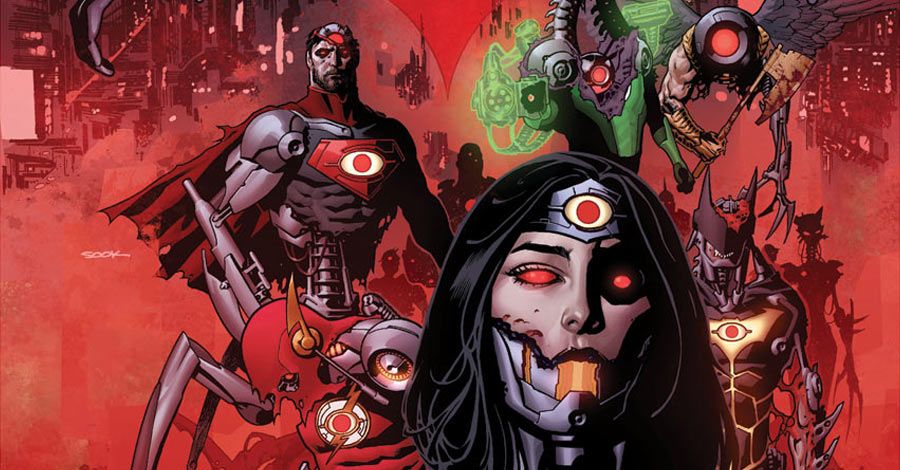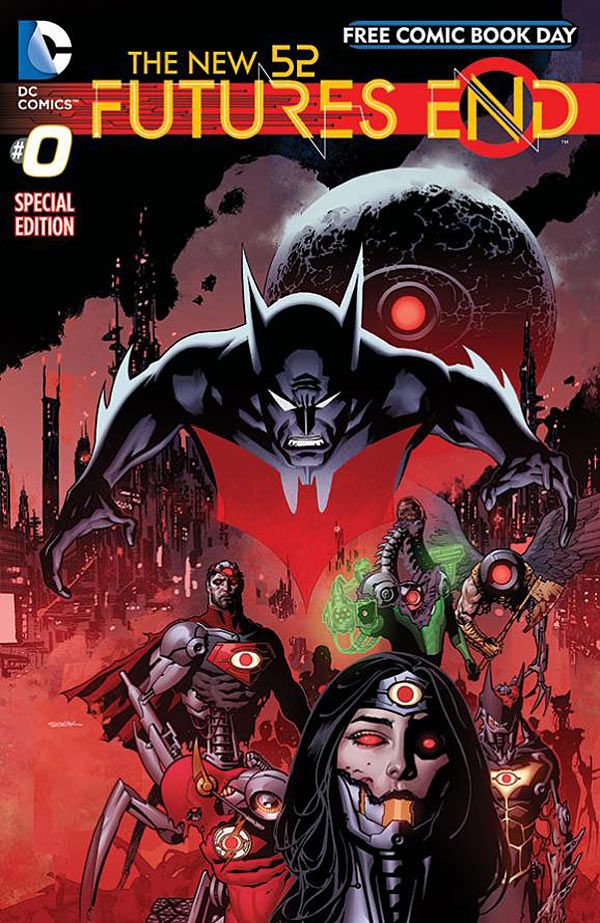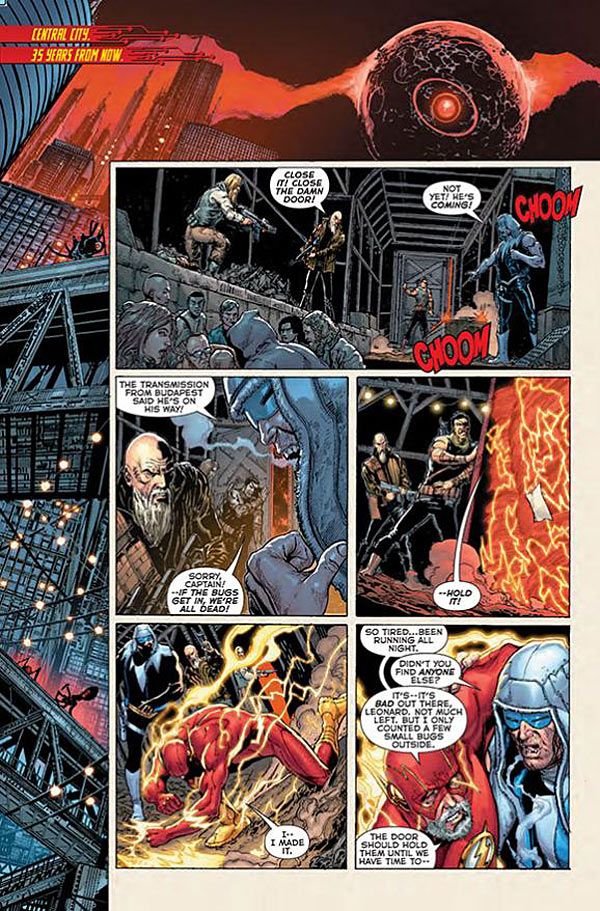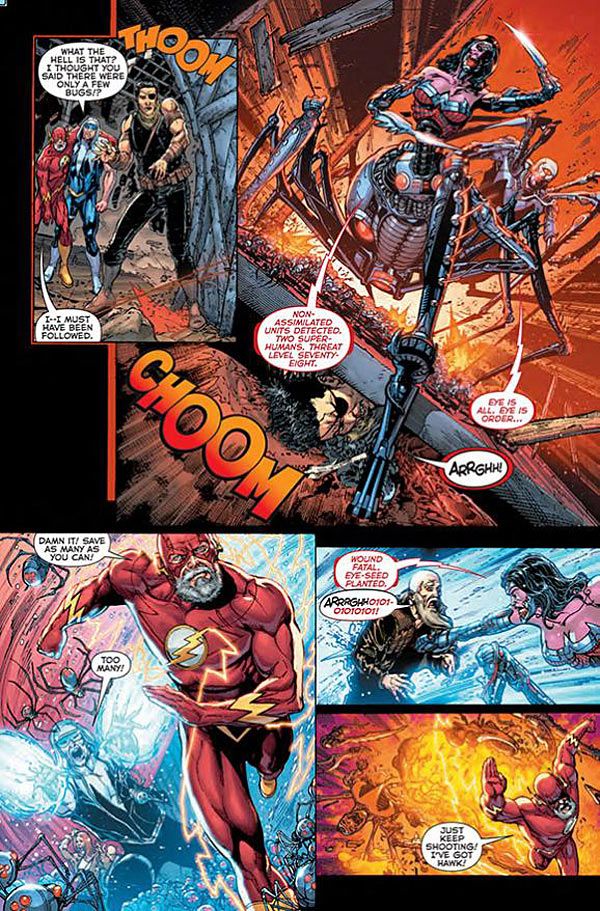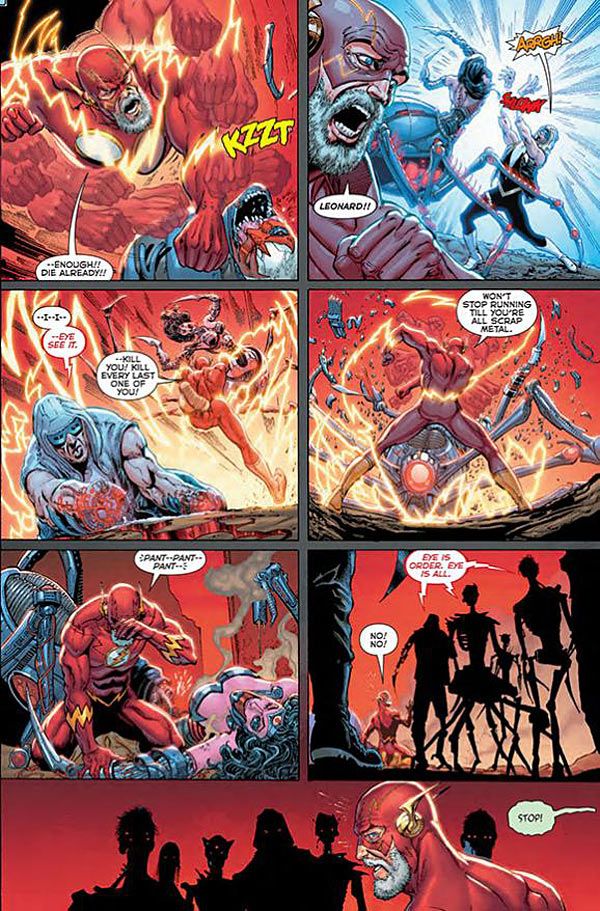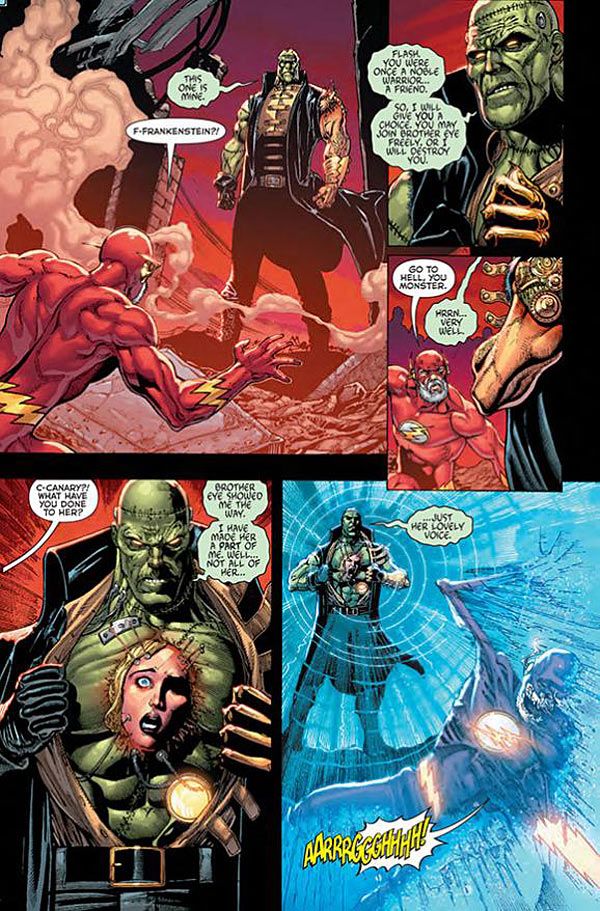DC Comics' latest weekly series, "New 52: Futures End," tackles the next phase of the DC Universe in more ways than one.
Aside from taking place five years beyond the present day and involving a plot where future Batman Terry McGinnins travels back to stop the spread of the deadly Brother Eye intelligence, the series has also been promoted as the platform from which DC's publishing line will spring in 2015 and beyond. At the heart of the undertaking are four writers who each have their own experience telling long form serials: Keith Giffen, Jeff Lemire, Brian Azzarello and Dan Jurgens.
DC Comics Jumps Forward 5 Years with Weekly "The New 52: Futures End"
In advance of "Futures End" #0 -- the Free Comic Book Day issue that launches the weekly this Saturday -- CBR News spoke with Azzarello and Jurgens about the creative mix that makes the series tick. From the roles the writers each play in shaping a massive story to the way characters like Firestorm, Grifter and Batman Beyond got tapped, the pair look forward to their plans to make the DC Universe follow their lead for the coming year.
CBR News: Gentlemen, one thing that always strikes me as interesting when it comes to these big weekly series is the creative alchemy of the team. So how does the skill set break down amongst writers? In other words, who's the safe cracker, and who's the getaway driver?
Dan Jurgens: I don't know. It's interesting that we have so many questions about how we work together.
Brian Azzarello: Let's see. Jeff is Murdock. Keith is Mr. T. Who can be Hannibal? I guess I'll be Hannibal. You can be Face.
Jurgens: Okay! [Laughter]
Well, when you say it in those terms... I know this group came together piece by piece. So has anyone ended up taking the lead?
Azzarello: No.
Jurgens: It weaves. It kind of goes in and out and back and forth. There are points in our plotting sessions where we spend a great deal of time, for example, talking about something Keith is working on. And that's not necessarily Keith being the main voice. It's all of us working to get to a certain point with his story line and his characters. We have some stuff that we handle individually, but as far as the overall arc, it's been an equal contribution.
RELATED: Writing Team Ready to "Blow Things Up" in DC's Weekly "Futures End"
How do you plot things out for the whole year then? Dan, you've worked on big projects similar in shape to this, and Brian I know with something like "Wonder Woman" you wrote a very specific outline from the start. But since this has so many moving parts, do you lock everything down, or does their have to be a level of flexibility?
Azzarello: We tried to plot it out, but there had to be that flexibility. When we get together to do summits, we're always going, "Oh my God, we have to back and change this now." There's a lot of work already put in that has to be changed because we come up with a better way to deal with it.
Jurgens: There are aspects of the end that we'll change, and then we have to go back and change something at the beginning. Then that'll mean something completely different two-thirds of the way through needs changing. But at one point, we hit a point with the ending where as soon as we got to it we all knew that was it. We could go to Dan [DiDio] and say, "This is it. This is how it all ends."
Azzarello: But even that meant, "But we've got to go back and change all this." [Laughter]
Jurgens: Right. But those are the moments you work for -- when you can all look at each other and say, "We've got something." You can really plant your flag in that and say, "It can't be anything else but this." And that really became the idea we could build everything backwards from.
Azzarello: Yeah. It's a time travel story, and they're tough.
So did you agree upon what your time travel rules would be -- whether they're the Marty McFly rules or the Star Trek ones or whatever?
Jurgens: We played around with all that.
Azzarello: We did. But I think it makes sense that way we're doing it.
So how did you land on all the characters that would play a role? Dan, I know you'd worked with Firestorm in his solo series before this, and other characters involved like Mr. Terrific have had their own solo series at some point. But it seems like everyone is a character who's been freed up from New 52 continuity in some way. Combined with the five-year jump, did that mean you were looking for characters you could do anything with?
Azzarello: In some regards. We didn't want to just write another Justice League book.
Jurgens: If this was going to work, using someone like Flash meant obviously there would be some restrictions on what we could do. But even with Firestorm where I had worked on his series before, that's not why he became a part of this. It really was that if we were going to tell a story set five years from now, I was interested in taking all these kid characters DC had who in the current stories would be 16 or 17 because five years later they'd all be of college age. They might be out of college. They might not have gone to college. That is a five-year period in which a lot of character growth and transformation is possible for people. You see people change a lot from 17 to 22, and you don't change in the same way from 30 to 35. That's why I was interested in using Firestorm -- because the idea of the character fit into that with who Jason and Ronnie are. So all these characters in "Futures End" are there for different reasons, but it's very natural.
It seems similar with Terry McGinnis. We've always known him as the young Batman Beyond finding his way, but I'm guessing that's out the window here?
Azzarello: Yeah, it's a different Terry. He's sure of himself. But that's because of the circumstances he's coming from. The world is a mess, and he's a soldier.
I wanted to ask you to about the WildStorm characters who you have some experience with and who tend to demand going a little further on the action scale. And Dan, you to did some work with Hellspont in your recent "Superman" issues. Did you view characters like Grifter and other WS holdovers as a collective in some way as you integrate them more into the DCU here?
Azzarello: No.
Jurgens: Not at all. For example, Keith began some of this by talking about a character type he had in mind, and talking about that is what brought Grifter into the picture.
Azzarello: It's a real similar approach to what you took with Firestorm -- wanting to tell this story where young people gathered and then plugging people into that idea. That's how we got Terry in there too, actually.
Jurgens: Yeah, it was never "Let's do a Grifter story." It was talking about the kind of character and story Keith wanted to tell, and I don't even remember now when Grifter became a part of the conversation. But once he did, we all went, "Yeah, it's got to be him." And you continue to build the story around him.
The other big creative challenge with a series like this is that while everything becomes a character piece on its own terms, these weekly books are often about world-building and massive, universe-level stuff. So for all of you, what was the one driving element that didn't change from the very early discussions through to now?
Jurgens: It's probably time travel and Terry.
Azzarello: Yeah, but even there we had some room to change.
And I know you've said you collectively rewrote the #0 issue for Free Comic Book Day over and over again. What ultimately became the big throat grabber to kick off the whole series?
Jurgens: I think what really had to make it work was that there are some big moments we had to sell in that #0 issue. And then we had to make it the kind of thing that would entice a lot of long time DC readers as well as people who haven't been picking up a lot of comics lately. We certainly have to have the assumption here that because it's a free comic, there are going to be people coming in and picking it up who don't have that high level of familiarity with the characters. They might recognize the red S but not know the nuances. And they're going to be thrown into this radically different world. We certainly went back even after the first script had been accepted and added more detail just to make sure we were communicating to everyone equally. That's even different from discovering the overall plot in the first place.
RELATED: DiDio Says All Three Weekly DC Series Will End in March 2015
Everyone's been making a deal of the fact that all the DC weekly series are ending at the same time, so there's obviously a big publishing plan or shift in the offing there. But for "Futures End," like I said, the five-year gap means that for the most part you can write free of big continuity concerns. By the time this wraps, do you expect that the series will crash back into the DCU proper one way or another?
Azzarello: We're actually going in the opposite direction. [Laughter]
Jurgens: Yeah, I'd certainly say that we can't make any assumption that just because we take place five years from now that there aren't tendrils of connection to the DCU we see now. That would be an incorrect assumption. We're starting like that, but then we're saying "Here are things that will happen over the next five years of the DCU that will bring earth to this place and these characters to this place." We start there -- it's the foundation of the building -- and then go from there.
Azzarello: We're not going to crash back into the DCU. We're going to drag the DCU along with us.
"Futures End" #0 arrives tomorrow on Free Comic Book Day, and the series then ships weekly from DC Comics starting Wednesday, May 7.

